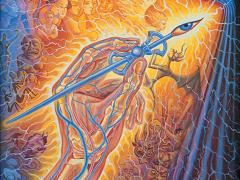Prof. Richard C. Schwartz, Ph.D. in Dialogue with Dr. Marc Gafni
In the following 2-part dialogue (see the playlist below), Dr. Richard C. Schwartz and Marc Gafni explore the contribution of Unique Self to family therapy and other aspects of psychology. Following their discussion, Richard sent Marc this written communication:
Many spiritual traditions make the mistake of viewing ‘the ego’ as the problem. At worst it vilified as greedy, anxious, clinging, needy, focused on wounds from the past or fear in the future, full of limiting or false beliefs about you, the source of all suffering, and something one must evolve beyond in order to taste enlightenment. At best it is seen as a confused and childish — to be treated with patience and acceptance but not to be taken seriously or listened to. My 30 years of experience exploring internal worlds has led to very different conclusions regarding the ego. What is called the ego or false self in these spiritualities is a collection of sub-personalities I call ‘parts.’ When you first become aware of them, these parts manifest all the negative qualities described above, so I understand why this mistake is so widespread.
As you get to know them from a place of curiosity and compassion, however, you learn that they are not what they seem. Instead, they are spiritual beings themselves who, because of being hurt by events in your life, are forced into roles that are far from their natures, and carry extreme beliefs and emotions that drive their limiting or suffering perspectives. Once they are able to release those beliefs and emotions (what I call burdens) they immediately transform into their natural, enlightened states and can join your evolution toward increasing embodiment of your true nature, what Marc Gafni importantly refers to as correctly, your Unique Self.
Thus, if instead of trying to ignore or transcend an annoying ego, you relate to even the apparent worst of your parts with love and open curiosity you will find that, just like you, they long for the liberating realization of their connection with the divine and provide delightful and sage company on your journey toward enlightenment. In this way you will be relating to these inner entities in the same way that Jesus and Buddha taught us to relate to suffering, exiled people.
Richard Schwartz is a leading expert in the field of psychotherapy and recognized as the founding developer of Internal Family Systems Theory, an influential therapeutical model which combines systems thinking with an integrative view of the mind and its discrete qualities.


 How do our unique perspectives of the world color our relationship with beauty, creativity, and transcendence? Join Alex Grey, Diane Musho Hamilton, and Dr. Marc Gafni for a cutting-edge dialogue on Creativity and Unique Self.
How do our unique perspectives of the world color our relationship with beauty, creativity, and transcendence? Join Alex Grey, Diane Musho Hamilton, and Dr. Marc Gafni for a cutting-edge dialogue on Creativity and Unique Self.